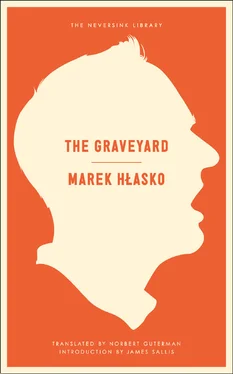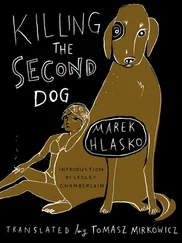“Whom did you say all this to?”
“To whom? To whom? Does it matter? What matters is that I’m saying it to myself.”
“What happened afterward?”
“What happened afterward is beside the point. I was expelled from the party. But that’s beside the point too.”
“And so?”
“I want you to tell me.”
“Tell you what?”
“That I’m wrong.”
They were silent for a while. The other looked at Franciszek with his lusterless eyes, his head slightly bowed. “Listen,” he said at last. “The first year after the war I worked for the security police. I had a son; all through the occupation he was in the underground; then he took part in armed attacks, was riddled with bullets, lost one lung, and finally, as an invalid, he landed in my office. In my office, where he had to do the work of three strong healthy men. So he worked — interrogations, investigations, spies, saboteurs, diversionists. Once he questioned a diversionist; he had been questioning him I don’t know how many nights on end; the prisoner behaved provocatively, and finally my boy — sick, almost dead with exhaustion, his nerves strained to the breaking point — couldn’t stand it any more and struck the diversionist in the face.” He paused.
“Well, what then?” Franciszek asked.
Birch smiled strangely. “Well, nothing,” he said. “I had to lock him up — eight years in jail. I myself saw to it that he was sentenced. And do you know what the diversionist got? Five years. He was a halfwit; he didn’t even know what he was doing, or who he was working against. Whereas my son was a conscious, militant party member, and was supposed to know what he was doing.”
He rose suddenly and began to pace the room. His neck grew purple, and his upper lip quivered. “Goddam it to hell!” he said. “To hell with this goddam chatter! What matters are the consequences, the final consequences. Once you’ve started a revolution, you have to realize that it can’t be stopped, or moderated, or turned off, or delayed. A revolution can be only won or lost, and that’s all. What horrifies you? The dimensions? The methods?”
“The consequences,” Franciszek said. “What you said a moment ago. Is the revolution a blind, brutal force?”
Birch gripped Franciszek by the arm and led him to the window. Before them lay the wet city, bristling with scaffoldings. “Here, to this place,” Birch said, “in I don’t know how many years, a man will come who hasn’t yet been born. He will come and he’ll want to live, to have food, an apartment, children, a family; he will want to live in security and he will expect the time he lives in to provide everything a man is entitled to. I assure you that he won’t be concerned with your sufferings and doubts, or mine. He will evaluate the world he finds by the yardstick of his reason. And that’s all.”
He fell silent. He looked down at the wet scaffoldings, and his sickly yellow face darkened.
“You have a son,” Franciszek said. “I didn’t know.”
Birch raised his head. “ ‘Have’?” he said. “I had. He’s so sick he’ll never survive it all …” He walked up to the radio and turned the knob. “Excuse me, Franciszek,” he said, “but yesterday I made a speech at a meeting and now they’re going to broadcast it. I want to listen.”
Franciszek was silent. What had he come here for? Who had he been talking to? And what had he expected to hear in reply? He had heard only what he himself had repeated a million times to himself and others, in order to find strength to act. And where was that strength? In Mikołaj’s departure, in Bear’s failure, or in the tired voice of this man who had sentenced his own son? Where was the goal, and the hope? Was it really in this man still unborn who would confront life unseeing, ignorant of the sacrifices and renunciations and defeats others had suffered for his sake, those others who had been tortured to death and thrown on the dung pile? If this contented blind man of the future, who would walk with a smile upon this filthy earth, was to be our hope, if our sacrifices were for his sake, what would justify them?
“May Day is near,” Birch’s voice said on the radio. “Comrades. The founders of Marxism-Leninism teach us that the working class cannot emancipate itself without emancipating all the oppressed and exploited, without abolishing all oppression and exploitation of man by man. The working class is the class under whose leadership mankind emancipates itself from all forms of social injustice, from everything that obstructs social progress. The working class is the class under whose leadership mankind takes the historic leap from the realm of necessity to the realm of freedom, achieves mastery over nature, and begins, through knowledge of the laws of social evolution, consciously to shape its fate.”
He was interrupted by long and frantic applause. Then he went on:
“The doctrine of Marx and Engels was further developed by Lenin and Stalin, our Great Teacher. They developed it in the age of imperialism, when capitalist oppression and exploitation had spread over the entire terrestrial globe and combined with all the pre-capitalist forms of enslavement of labor, when the greed of the imperialist exploiters threw mankind into bloody wars of historically unprecedented dimensions, when the bourgeoisie and its ideologists betrayed and trampled upon all ideals, including the limited freedom and justice they themselves had once proclaimed, and when the working masses of the entire world were filled with a growing and irresistible aspiration for full social justice and full freedom — the aspiration toward socialism …”
Long and frantic applause.
“Lenin and the Great Teacher,” the speaker went on, “developed the doctrine of Marx and Engels according to which the working class is the class destined to free mankind from all exploitation and oppression, and gave us the doctrine of the leadership of the proletariat in the struggles for national liberation, in the struggles of the peasant masses against the feudal regime and its survivals, in the struggles of all toiling people against the capitalist regime …”
Again there was a mighty clamor. “Long, resounding applause,” Franciszek said. “That’s what all the newspapers will say.”
The speaker went on: “Standing at the head of all the oppressed and exploited in the struggle to overthrow imperialist tyranny, forging the alliance between the workers and the toiling peasants and the popular masses engaged in a struggle for national liberation, the party of the proletariat raises the banner of emancipation in the name of the overwhelming majority of society against an insignificant minority of exploiters. The leadership of the working class aims at carrying out, by the proletariat, a great revolutionary task, consisting in the creation of new social conditions in the interests of the overwhelming majority of people in the whole world, and in the construction of a socialist society …”
“Everything true to form,” Franciszek said, “wasn’t it? The hired orphan with the flowers, and some old fogy, a veteran of the 1905 revolution, whom you embraced before the cameras; and secret policemen in dark blue uniforms behind you. Wasn’t it so?”
“Correct,” said Birch. “And there were people who, after the whole thing was over, asked whether I couldn’t get the woman at the refreshment stand to open an hour early; and there was a fellow who whispered into my ear, ‘Malinowski is a thief.’ ”
“But these details won’t be broadcast, will they?” Franciszek said.
“No, they won’t,” said Birch.
He fell silent and listened to his own voice: “The victorious Great Socialist October Revolution created the first proletarian state, the Soviet state. Henceforward, loyalty to proletarian internationalism is above all loyalty to October. It is no accident that the treachery of the Tito clique manifested itself from the outset in its anti-Soviet attitude, in its negation of the leading role of the Soviet Union. It is no accident that anti-Soviet tendencies were at the basis of Gomułkism, the Polish variety of Titoism. The great achievement of the Soviet Union is the model, the example, the hope of the world. It is a model which proves that there is a way out of depressions and misery, economic and cultural backwardness, oppressions of national minorities, and wars between nations. It is an example which teaches us how to overthrow the rule of capitalists and landlords, how to build a new, just society. It is the hope of all those who are oppressed by exploiters, enslaved by imperialists, tortured by reactionaries who hate the toiling masses. The great constructive work of the Soviet Union is a source of strength for the proletarian movement, for progressive and libertarian movements the world over. It is the strength of the Soviet Union that smashed the Hitlerite dream of making a fascist master race the rulers of the world. It is the strength of the Soviet Union that stands in the way of the Wall Street magnates who are trying to repeat Hitler’s attempt to enslave mankind. The international proletariat led by the Soviet Union has become the vanguard of mankind, of all toiling men, of all the oppressed and exploited the world over, in the struggle for a better tomorrow without wars, a tomorrow without oppression and exploitation, a tomorrow of material prosperity and cultural flowering …” His voice was drowned out for a while; once again there was a clamor in the great auditorium, and happy cries rang out; at one point someone could even be heard saying, “There was misery, there was capitalism; then came a man named Lenin …”
Читать дальше






![Ричард Деминг - Whistle Past the Graveyard [= Give the Girl a Gun]](/books/412176/richard-deming-whistle-past-the-graveyard-give-t-thumb.webp)


